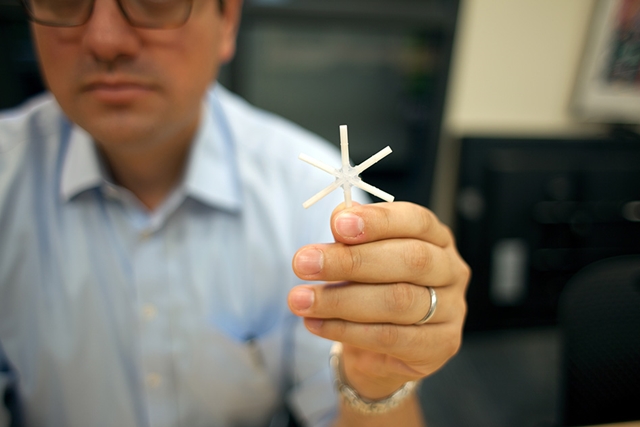
Researcher Giovanni Traverso holds the star-shaped drug delivery device (Mass. Institute of Technology)
10 Dec. 2018. Techniques for delivering drugs in capsule form that last a week or longer in the patient are expected to receive a patent soon from U.S. authorities. Lyndra Therapeutics Inc. in Watertown, Massachusetts that owns the rights to the technology first developed at Massachusetts Institute of Technology, says it received a notice of allowance — a document indicating intent to issue a patent — from the U.S. Patent and Trademark Office.
Lyndra Therapeutics develops a process for delivering drugs as capsules that dispense their contents over one week or more. Taking medications once a week or less is expected to make it easier for many people to stick to their drug regimens. Medication adherence is a continuing problem, particularly for older individuals with chronic diseases, who must take multiple medications at different times during the day. A study published in 2011 found about half of chronic disease patients do not take their medications as prescribed, which the authors attribute to a factors including lack of health literacy by patients, ineffective communication by clinicians, and care given by multiple health care providers.
The company’s technology is based on research in the MIT lab of Robert Langer, a biotechnology and materials science professor, and gastroenterologist and biomedical engineer Giovanni Traverso at Brigham and Women’s Hospital, affiliated with Harvard Medical School. They devised a six-armed snowflake or star made from polycaprolactone, or PCL, a biodegradable polymer. The delivered drug is loaded on each PCL arm, held together with with a softer, rubber-like plastic. That soft middle section makes it possible to fold the arms into an ingestible capsule, with the softer plastic also degrading faster than the more rigid PCL.
After the capsule is swallowed, stomach acid breaks down the outer capsule, releasing and unfolding the drug-laden star. Tests with pigs that have digestive systems similar to humans, using a malaria drug, shows the PCL star can last as long as 2 weeks in the stomach, but also passing through the animals without affecting normal digestive processes. A more complex drug delivery task loaded 3 different antiretroviral drugs to treat HIV infections on the star that needed to release their drugs at different times. As reported by Science & Enterprise in January 2018, the polymer stars delivered the 3 drugs in pigs at different rates over a 7-day period, also with the polymer stars passing through the pigs without a problem.
Lyndra Therapeutics, a 3 year-old enterprise, is developing once-a-week oral deliveries for drugs to treat Alzheimer’s disease and psychiatric disorders, both in early-stage clinical trials. Weekly oral-drug deliveries are in earlier stages for opioid use disorder, cardiovascular and metabolic diseases, HIV infections, and for therapies that invoke the immune system. The company is also developing a biweekly delivery mechanism for malaria in early-stage trials and a once-a-month oral contraceptive.
The patent application was filed by MIT and Brigham and Women’s Hospital, which covers not only delivery of therapies, but also for diagnostics. A notice of allowance is considered the last step before granting a patent, indicating the USPTO fully reviewed the application and is ready for final issuance. Lyndra is the exclusive licensee of the technology.
More from Science & Enterprise:
- Nanotech Polymers Deliver More Effective Arthritis Therapy
- Protein Delivered with Gold Nanoparticles Helps Fix Muscle Injuries
- $29.5M Funding Raised for Sinus Drug Delivery Company
- Nanoscale Sponges Deliver Rheumatoid Arthritis Treatment
- Trial Testing Cancer Treatment Delivery Compound
* * *

 RSS - Posts
RSS - Posts
[…] licenses their technology for long-term drug delivery systems. As reported earlier this week in Science & Enterprise, the 3 year-old enterprise received notice that a patent based on this technology will be issued […]
[…] Patent Set for Long-Term Drug Capsules […]